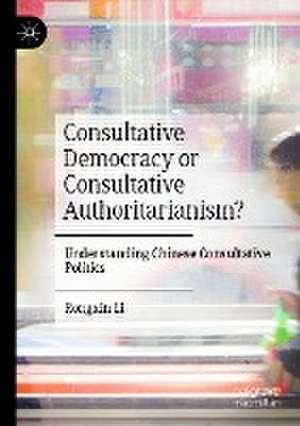Consultative Democracy or Consultative Authoritarianism?: Understanding Chinese Consultative Politics
Autor Rongxin Lien Limba Engleză Paperback – 13 aug 2023
| Toate formatele și edițiile | Preț | Express |
|---|---|---|
| Paperback (1) | 781.24 lei 6-8 săpt. | |
| Springer Nature Singapore – 13 aug 2023 | 781.24 lei 6-8 săpt. | |
| Hardback (1) | 785.55 lei 6-8 săpt. | |
| Springer Nature Singapore – 12 aug 2022 | 785.55 lei 6-8 săpt. |
Preț: 781.24 lei
Preț vechi: 952.73 lei
-18% Nou
Puncte Express: 1172
Preț estimativ în valută:
149.50€ • 154.46$ • 124.36£
149.50€ • 154.46$ • 124.36£
Carte tipărită la comandă
Livrare economică 19 martie-02 aprilie
Preluare comenzi: 021 569.72.76
Specificații
ISBN-13: 9789811938719
ISBN-10: 9811938717
Ilustrații: XIII, 304 p. 2 illus.
Dimensiuni: 148 x 210 mm
Greutate: 0.42 kg
Ediția:1st ed. 2022
Editura: Springer Nature Singapore
Colecția Palgrave Macmillan
Locul publicării:Singapore, Singapore
ISBN-10: 9811938717
Ilustrații: XIII, 304 p. 2 illus.
Dimensiuni: 148 x 210 mm
Greutate: 0.42 kg
Ediția:1st ed. 2022
Editura: Springer Nature Singapore
Colecția Palgrave Macmillan
Locul publicării:Singapore, Singapore
Cuprins
1. Introduction.- 2. Deliberative democracy in the west.- 3. Aythoritarian deliberation, aythoritarian consultation and beyond.- 4. Consultative democracy and beyond, an indiginalized reframing of ‘deliberative democracy’.- 5. Reconsolidation of chinese authoritarianism? The institutionalization of consultation.- 6. Consultative/deliberative governance in practice.- 7. Conclusion.
Notă biografică
Rongxin Li is a postdoctoral fellow at School of Government and Research Center for Chinese Politics, Peking University, China; he holds a PhD from the Research Center of Sociological and Political Study in Paris and Paris 8 University, France.
Textul de pe ultima copertă
This book theorizes Chinese politics, specifically about China’s “deliberative democracy (xieshang minzhu 协商民主)”. Creating a China-West comparative framework, the author interrogates China's government's claims to give representation to citizens, allowing readers to see how all of these concepts interact within Chinese ideology, democratic discourse, and governance, and their relationship with Chinese authoritarianism. Above all, this book represents a sustained hybridization of political theory, one which is neither a simple democratic-authoritarian dichotomy, nor a reinterpretation of the official propaganda. This study will interest scholars of Chinese politics and statecraft, shedding light on an emergent discourse of the state – Chinese xieshang minzhu. More importantly, this book goes beyond a simple rhetorical and linguistic use of ‘deliberative democracy’ in the Western sense, and rather emphasizes the very consultative nature of Chinese politics, which facilitates and reconsolidates Chinese authoritarianism.
Rongxin Li is a postdoctoral fellow at School of Government and Research Center for Chinese Politics, Peking University, China; he holds a PhD from the Research Center of Sociological and Political Study in Paris and Paris 8 University, France.
Caracteristici
Theorizes China's political model Addresses ideological conflicts between China and the West Constructs a model for technocratic populism
